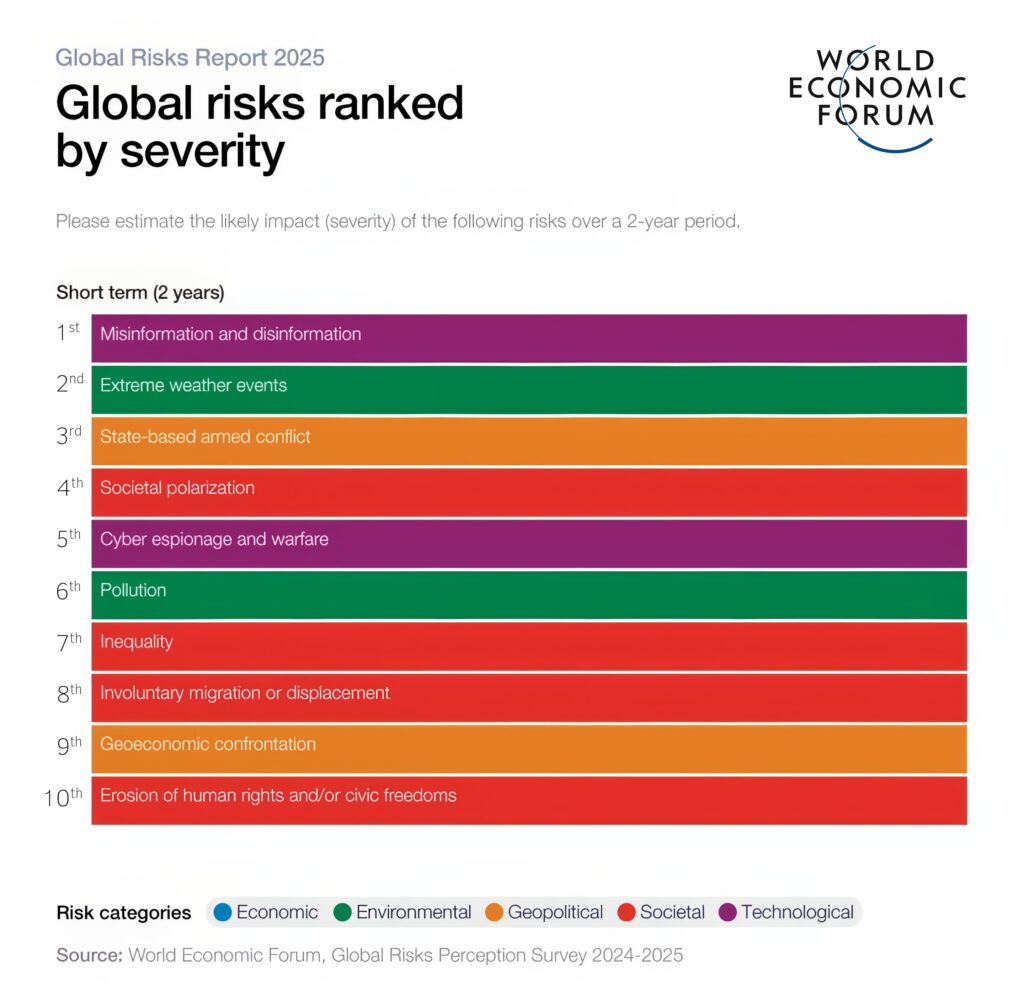The World Economic Forum: AI-Powered Narrative Attacks Remain Top Global Risk in 2025
The WEF’s 2025 Global Risks Report identifies AI-powered narrative attacks created by misinformation and disinformation as the top global threat, and fan the flames of the top five risks including extreme weather, state-based armed conflict, societal polarization, and cyber espionage.

The World Economic Forum’s (WEF) Global Risks Report 2025 highlights the escalating threat of narrative attacks created by misinformation and disinformation.
The Global Risks Report 2025 ranks societal, economic, and geopolitical risks, and was developed by the World Economic Forum’s Global Risks Initiative through a comprehensive process that combined data collection, expert analysis, and stakeholder collaboration. Insights were drawn from the Global Risks Perception Survey, conducted in September and October 2024, which gathered input from over 900 global experts, policymakers, and industry leaders to rank risks by severity and time horizon. The report integrated cross-sector perspectives to analyze interconnected risks across geopolitical, environmental, societal, and technological domains, emphasizing how these risks amplify one another.
AI-enabled narrative attacks created by misinformation and disinformation top the list for the second year in a row. Notably, manipulated narratives also amplify the top five global risks that Blackbird.AI’s RAV3N Narrative Intelligence research team recently investigated.
WEF’S Top Five Global Risks:
1.) Misinformation and Disinformation
3.) State-based Armed Conflict
5.) Cyber Espionage
“Rising geopolitical tensions and a fracturing of trust are driving the global risk landscape. In this complex and dynamic context, leaders have a choice: to find ways to foster collaboration and resilience, or face compounding vulnerabilities,” WEF Managing Director Mirek Dušek said in a statement.
LEARN MORE: What Is A Narrative Attack?
The report states it is increasingly challenging to distinguish between misinformation and disinformation generated by AI and that created by humans. AI tools are driving a surge in false or misleading content across various formats, including video, images, voice, and text. State actors in certain countries remain among the primary sources of this deceptive material. Generative AI significantly reduces the barriers to producing and distributing content, including inaccurate or misleading material. This technology enables threat actors, state agencies in certain nations, activist groups, and individuals—whether or not they have criminal intent—to automate and amplify disinformation campaigns, vastly expanding their reach and influence.
The World Economic Forum is not alone in identifying the threat of manipulated narratives. Management consulting firm Gartner predicts that by 2028 enterprise spending on battling malinformation will surpass $30 billion. Research analyst firm Forrester’s recently published External Threat Intelligence Landscape 2025 Report listed narrative attacks as a top cybersecurity risk. Of the 29 notable vendors included, Blackbird.AI is the only vendor focused on protecting organizations against narrative attacks. Blackbird.AI’s founding mission, since 2017, is to protect organizations from narrative attacks, a rapidly-growing challenge.
“Narrative attacks fueled by misinformation and disinformation have once again been ranked as the number one global risk by the World Economic Forum—a testament to the pervasive impact of this new threat vector,” said Blackbird.AI CEO Wasim Khaled. “But what’s even more alarming is that the top five risks are also highly vulnerable to narrative manipulation. These threats don’t exist in isolation; they are amplified and weaponized, creating a cascade of vulnerabilities that affect executives, organizations, and society alike.”
The World Economic Forum’s Global Risks Report 2025 recommends the development of international frameworks to govern the ethical use of AI in information dissemination and the strengthening of digital literacy programs to equip individuals with the skills to critically assess the information they encounter.
In addition to technological solutions, the report emphasizes the importance of societal resilience. The report calls for enhanced global cooperation to address the challenges posed by AI-driven narrative attacks. Building public trust through transparent communication and reinforcing the integrity of information channels are deemed essential steps in mitigating the impact of narrative attacks.
To see the World Economic Forum report, visit here. To receive a complimentary copy of the Forrester External Threat Intelligence Landscape 2025 Report, visit here.
- To receive a complimentary copy of The Forrester External Threat Intelligence Landscape 2025 Report, visit here.
- To learn more about how Blackbird.AI can help you in these situations, book a demo.
Wasim •
Wasim Khaled is the CEO and Co-Founder of Blackbird.AI, an AI-powered risk and narrative intelligence platform at the forefront of combating disinformation and narrative attacks. A computer scientist by training, Khaled has deep expertise in information operations, computational propaganda, behavioral science, and artificial intelligence, particularly in their applications to defense, cybersecurity, and risk intelligence. He has advised government agencies and Fortune 500 companies on mitigating the risks of escalating information warfare. Khaled is a member of the Social Intelligence Lab and the Weber Shandwick Collective, and his insights have been featured in TechCrunch, WIRED, The New York Times, Bloomberg, Fortune, NPR, and NASDAQ. Before founding Blackbird.AI, he launched LuxMobile, an Inc. 500 Fastest Growing Company in America, and was named the Inc. 500 Asian Entrepreneur of the Year.
Wasim Khaled is the CEO and Co-Founder of Blackbird.AI, an AI-powered risk and narrative intelligence platform at the forefront of combating disinformation and narrative attacks. A computer scientist by training, Khaled has deep expertise in information operations, computational propaganda, behavioral science, and artificial intelligence, particularly in their applications to defense, cybersecurity, and risk intelligence. He has advised government agencies and Fortune 500 companies on mitigating the risks of escalating information warfare. Khaled is a member of the Social Intelligence Lab and the Weber Shandwick Collective, and his insights have been featured in TechCrunch, WIRED, The New York Times, Bloomberg, Fortune, NPR, and NASDAQ. Before founding Blackbird.AI, he launched LuxMobile, an Inc. 500 Fastest Growing Company in America, and was named the Inc. 500 Asian Entrepreneur of the Year.
Need help protecting your organization?
Book a demo today to learn more about Blackbird.AI.



